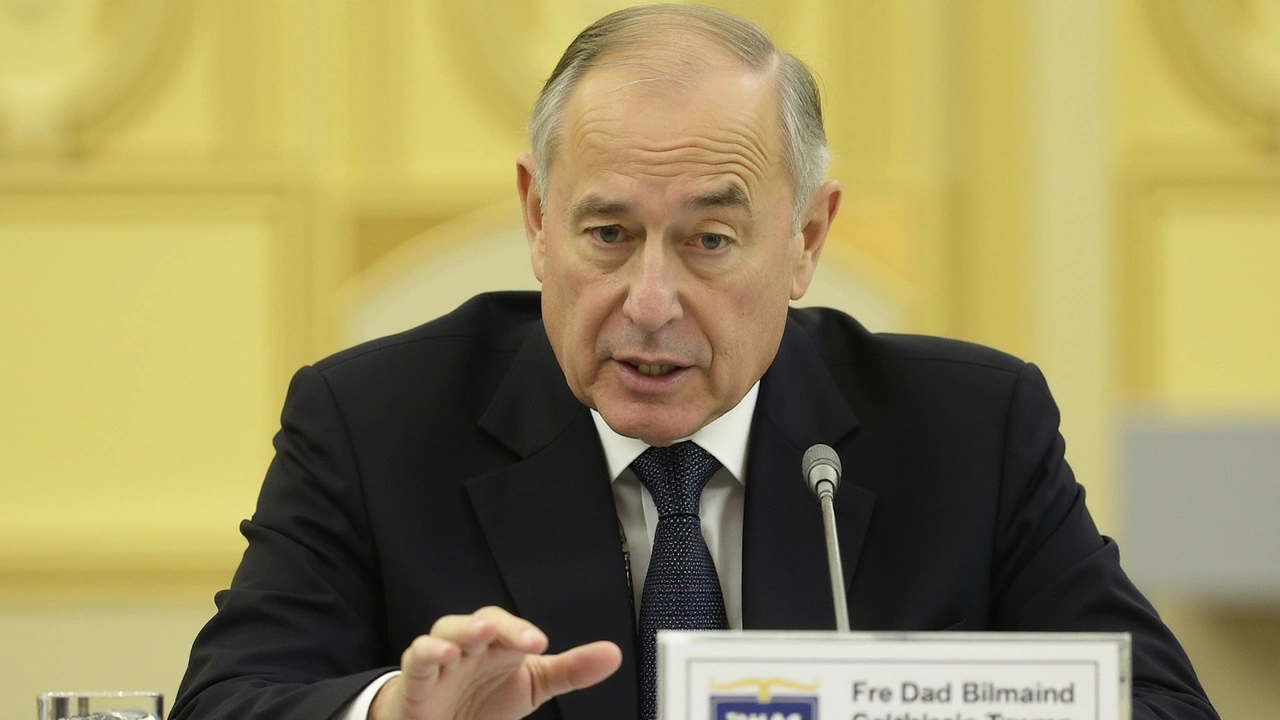Kremlin Refutes Allegations of Phone Calls Between Putin and Trump After Presidency

Kremlin Denies Alleged Post-Presidency Putin-Trump Phone Calls
In an unexpected revelation, the Kremlin has firmly denied any claims suggesting that Russian President Vladimir Putin has kept communication lines open with former U.S. President Donald Trump following Trump's departure from presidential office. This denial was articulated by Kremlin spokesperson Dmitry Peskov during an interaction with a Russian media outlet. In response to inquiries about supposed phone calls between the two leaders, Peskov stated plainly, "No, it's not like that." This straightforward dismissal addresses the allegations made by journalist Bob Woodward in his soon-to-be-released book titled "War." These claims involve repeated secret phone exchanges and other covert interactions between Trump and Putin, stirring considerable controversy and intrigue.
Woodward, a journalist renowned for his investigative works, including the famous Watergate scandal, claims that Trump and Putin may have held as many as seven private phone conversations since Trump exited the White House in early 2021. These discussions have reportedly included topics that remain undisclosed. However, according to Woodward's exposé, one particularly contentious claim notes that Trump instructed an aide to vacate the room during what was described as a confidential call with Putin at his Mar-a-Lago estate in what appears to be early 2024. This alleged call, as well as other claims regarding clandestine Covid-19 assistance to Russia, has sent ripples through the corridors of political power both in the United States and globally.
Trump, ever vocal about matters related to his post-presidency activities, has vehemently brushed off the accusations. Demonstrating his usual pugnacious style, Trump lashed out at Woodward, labeling him a "storyteller" and suggesting that the veteran journalist might have "lost his marbles." These remarks highlight Trump's characteristic dismissal of claims he deems to be fictitious or exaggerated, a stance that seems consistent with his reaction to previous media portrayals that he has fervently contested. This disputing of Woodward’s allegations is not new, as Trump has frequently found himself at the heart of such narratives over the years.
Kremlin's Firm Denial of the Allegations
The Kremlin has also played its part in quelling these rumors, categorically rebutting Woodward’s assertions regarding any ongoing phone dialogues with Trump. Peskov’s comments underscore the Kremlin’s position that no such communications have occurred since Trump stepped down. Such assertions serve to nullify any suggestion that Putin has maintained an unusually close connection with Trump outside the official protocols typically observed in international relations. By fully denying these claims, the Kremlin aims to defuse tensions that may threaten to worsen already sensitive diplomatic relations with the United States.
In the world of international relations, the relationships between leaders can often influence broader geopolitical dynamics significantly. Any implications about ongoing secret communications between high-profile leaders automatically attract attention from analysts and the press. Given the current global climate and the fraying fabric of international relationships, especially with respect to Russia and the United States, such rumors, if left unchecked, could escalate into substantial diplomatic scandals.
Woodward's Book: War and Its Implications
Bob Woodward's upcoming book, "War," which includes these explosive allegations, is already generating substantial buzz ahead of its release. The book offers to dive into uncharted territories of political revelations with potential impacts that resonate beyond its covers. Woodward's past works have often exposed details that shape public perceptions of political figures and their decisions, and this new book appears to continue the tradition of unveiling hidden narratives behind the political theatre.
However, both the Kremlin and Trump's team have been quick to dismiss "War" as more fiction than fact. In response to Woodward’s assertions, Trump’s representatives have described the book's content as "made-up," rejecting any claims of coronavirus test machines being sneakily sent to Russia, amongst other allegations. This flat-out dismissal has cast shadows on the veracity of the book's claims, prompting debates over journalistic integrity, the nature of political documentation, and the responsibilities of both authors and their subjects.
As we anticipate the release of "War," questions linger about what real conversations might have transpired between these powerful figures after Trump's presidency, if any. People worldwide are left to form opinions on the accuracy of Woodward’s story, balancing between skepticism from the leaders involved and the allure of an investigative narrative promising unique new insights into the interplays of power at the highest levels.
The intricate dance between political figures, truth, and media narratives continues to captivate, with every new revelation sparking dialogues that provide fodder for endless speculation. Whether Woodward's insights will stand the test of time and scrutiny remains to be seen, but they undoubtedly add another layer to the complex portrait of the contemporary political landscape.






Ramesh Modi
October 10, 2024 AT 13:12Ah, the grand tapestry of geopolitics!-the whispers of alleged calls become a stage upon which truth, morality, and drama collide!!! Is not the very act of denial a performance, a curtain drawn over the very soul of power? Yet, we must ask-who holds the quill that scripts history? In the shadows, the narratives bleed, and we, the audience, are left to decipher the subtext. The Kremlin’s no reverberates like a solitary bell in a cathedral of suspicion; one must hear the echo of responsibility.
Ghanshyam Shinde
October 15, 2024 AT 22:48Well, look at this-another bestseller about secret chats that never happened, how original. The elite love their conspiracies, don't they?
Charlotte Louise Brazier
October 21, 2024 AT 08:24From my perspective, the allegations are a needless escalation; we should focus on diplomatic channels instead of sensational headlines. The aggressive tone only fuels division, and that does no one any good.
SAI JENA
October 26, 2024 AT 18:00Indeed, the discourse demands a measured response. As we analyze the statements, it is essential to uphold factual integrity while encouraging constructive dialogue among nations.
Donny Evason
November 1, 2024 AT 02:36Your cynicism, while noted, overlooks the cultural significance of transparent communication. In my view, responsible reporting sustains informed citizenry.
Hariom Kumar
November 6, 2024 AT 12:12Interesting claim 😊.
Phillip Cullinane
November 11, 2024 AT 21:48The discourse surrounding alleged post-presidential communications between the two leaders encapsulates a multifaceted interplay of diplomatic protocol, intelligence analysis, and media framing. From an empirical standpoint, the absence of verifiable intercepts or authenticated logs suggests a methodological lacuna in the current investigative approach. Moreover, the geopolitical ramifications of purported clandestine dialogues necessitate a granular assessment of bilateral risk matrices. In the realm of foreign policy, signaling theory posits that even rumors can serve as strategic leverages within negotiation dynamics. Consequently, the Kremlin's categorical denial operates as a counter-signal designed to mitigate escalation thresholds. Conversely, the United States' strategic communication apparatus may interpret such denials through a lens of partisan optics. Academically, scholars emphasize the importance of source triangulation, especially when dealing with high-stakes political narratives. The credibility of the journalist's claims hinges upon corroborative testimony from multiple independent actors. Absent such corroboration, the hypothesis remains speculative, residing within the domain of counterfactual analysis. Nonetheless, public perception is often shaped more by narrative potency than by evidentiary rigor. This phenomenon is evident in the proliferation of sensational headlines that prioritize click-through metrics. Policy makers, therefore, must navigate the tension between informational transparency and operational security. Balancing these considerations requires an interdisciplinary approach integrating diplomatic studies, intelligence assessment, and media literacy. In practice, that translates to a calibrated release of statements that neither inflame nor obscure the underlying realities. Ultimately, the discourse will evolve as new data emerges, and the scholarly community must remain vigilant in its analytical vigilance.
Janie Siernos
November 17, 2024 AT 07:24It is disconcerting how quickly narratives are constructed without substantiation, betraying a moral responsibility we ought to uphold.
joy mukherjee
November 22, 2024 AT 17:00I hear the concerns on both sides, and it’s clear that trust is fragile-let’s hope for clearer communication soon 😊.
Rob Chapman
November 28, 2024 AT 02:36Thoughts on power often remind me that reality is a reflection of our collective focus.
Delaney Lynch
December 3, 2024 AT 12:12Indeed!!! The layers of this story are numerous!!! Could there be undisclosed diplomatic channels at play???
Nicholas Mangraviti
December 8, 2024 AT 21:48Let’s stay hopeful that facts will surface soon.
Jared Greenwood
December 14, 2024 AT 07:24This is classic political theater; the media spins what the elite want, ignoring the real strategic agenda.
Sally Sparrow
December 19, 2024 AT 17:00Honestly, you’re all buying into a narrative concocted by those who profit from chaos.
Eric Yee
December 25, 2024 AT 02:36Well, that’s a harsh take but sometimes the truth is messy.
Sohila Sandher
December 30, 2024 AT 12:12Keep it up you guys, we can get through this as a team lol
Anthony Morgano
January 4, 2025 AT 21:48Totally agree! :) It's all about staying curious and supportive.
Holly B.
January 10, 2025 AT 07:24Your observations are noted; constructive dialogue remains essential.
Lauren Markovic
January 15, 2025 AT 17:00Here’s a quick summary: verify sources, cross-check facts, and stay open to updates 😊.
Kathryn Susan Jenifer
January 21, 2025 AT 02:36Oh, brilliant! Another chapter in the saga of conspiracy has been written-how utterly thrilling!